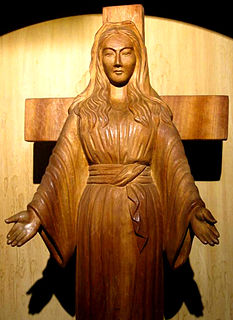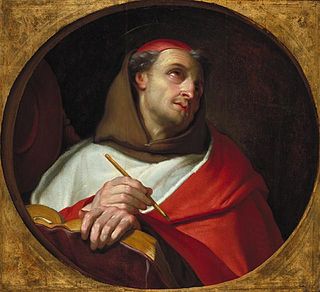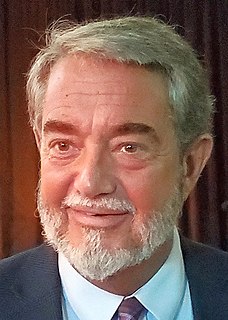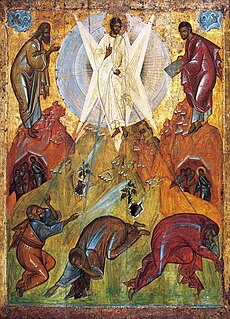
A miracle is an event that seems inexplicable by natural or scientific laws. In various religions, a phenomenon that is characterized as miraculous is often attributed to the actions of a supernatural being, magic, a miracle worker, a saint, or a religious leader.

Bonaventure, born Giovanni di Fidanza, was an Italian medieval Franciscan, scholastic theologian and philosopher. The seventh Minister General of the Order of Friars Minor, he was also Cardinal Bishop of Albano. He was canonised on 14 April 1482 by Pope Sixtus IV and declared a Doctor of the Church in the year 1588 by Pope Sixtus V. He is known as the "Seraphic Doctor". His feast day is July 15. Many writings believed in the Middle Ages to be his are now collected under the name Pseudo-Bonaventure.

In the scholastic system of education of the Middle Ages, disputations offered a formalized method of debate designed to uncover and establish truths in theology and in sciences. Fixed rules governed the process: they demanded dependence on traditional written authorities and the thorough understanding of each argument on each side.
Thomas Gerard Weinandy, OFM Cap, is an American Roman Catholic priest and a leading scholar. He is a prolific writer in both academic and popular works, including articles, books, and study courses.

Hans Küng was a Swiss Catholic priest, theologian, and author. From 1995 he was president of the Foundation for a Global Ethic.

Bede Griffiths OSB Cam, born Alan Richard Griffiths and also known by the end of his life as Swami Dayananda, was a British-born priest and Benedictine monk who lived in ashrams in South India and became a noted yogi. Griffiths was a part of the Christian Ashram Movement.
Charles Caldwell Ryrie was an American Bible scholar and Christian theologian. He served as professor of systematic theology and dean of doctoral studies at Dallas Theological Seminary and as president and professor at what is now Cairn University. After his retirement from Dallas Theological Seminary he also taught courses for Tyndale Theological Seminary. He is considered one of the most influential American theologians of the 20th century. He was the editor of The Ryrie Study Bible by Moody Publishers, containing more than 10,000 of Ryrie's explanatory notes. First published in 1978, it has sold more than 2 million copies. He was a notable proponent of classic premillennial dispensationalism.

Avery Robert Dulles was a Jesuit priest, theologian and cardinal of the Catholic Church. Dulles served on the faculty of Woodstock College from 1960 to 1974, of the Catholic University of America from 1974 to 1988, and as the Laurence J. McGinley Professor of Religion and Society at Fordham University from 1988 to 2008. He was an internationally-known author and lecturer.

Liberal Christianity, also known as liberal theology, is a movement that interprets and reforms Christian teaching by taking into consideration modern knowledge, science and ethics. It emphasizes the importance of reason and experience over doctrinal authority. Liberal Christians view their theology as an alternative to both atheistic rationalism and theologies based on traditional interpretations of external authority.

Scott W. Hahn is an American Catholic theologian and apologist. A former Presbyterian who converted to Catholicism, Hahn's popular works include Rome Sweet Home and The Lamb's Supper: The Mass as Heaven on Earth. His lectures have been featured in multiple audio distributions through Lighthouse Catholic Media. Hahn is known for his research on Early Christianity during the Apostolic Age and various theoretical works concerning the early Church Fathers.

Charles E. Curran is an American Roman Catholic priest and moral theologian. He currently serves at Southern Methodist University in Dallas, Texas, as the Elizabeth Scurlock University Professor of Human Values.

Richard Rohr,, is an American author, spiritual writer, and Franciscan friar based in Albuquerque, New Mexico. He was ordained to the priesthood in the Roman Catholic Church in 1970. PBS has called him "one of the most popular spirituality authors and speakers in the world."

In Palamite theology, there is a distinction between the essence (ousia) and the energies (energeia) of God. It was first formulated by Gregory Palamas (1296–1359) as part of his defense of the Athonite monastic practice of hesychasmos against the charge of heresy brought by the humanist scholar and theologian Barlaam of Calabria.
The Holy Bible: A Translation From the Latin Vulgate in the Light of the Hebrew and Greek Originals is a Catholic version of the Bible in three volumes translated by Monsignor Ronald Knox, the English theologian, priest and crime writer. It is more commonly known as the Knox Bible or Knox Version.
The Saint Ignatius Institute (SII) is an undergraduate program at the University of San Francisco (USF), a private university operated by the USA West Province of the Society of Jesus in San Francisco, California, United States.

Papal infallibility is a dogma of the Catholic Church which states that, in virtue of the promise of Jesus to Peter, the pope when appealing to his highest authority is preserved from the possibility of error on doctrine "initially given to the apostolic Church and handed down in Scripture and tradition". This doctrine was defined dogmatically at the First Vatican Council of 1869–1870 in the document Pastor aeternus, but had been defended before that, existing already in medieval theology and being the majority opinion at the time of the Counter-Reformation.

Daniel Patrick Horan is an American Franciscan friar, Roman Catholic priest, theologian, and author. He is currently the Duns Scotus Chair of Spirituality at Catholic Theological Union in Chicago. He is a columnist for National Catholic Reporter.

Christian contemplation, from contemplatio, refers to several Christian practices which aim at "looking at", "gazing at", "being aware of" God or the Divine. It includes several practices and theological concepts, and until the sixth century the practice of what is now called mysticism was referred to by the term contemplatio, c.q. theoria.
Herbert Haag was a Swiss Roman Catholic theologian and biblical scholar of German origin.
James Atkinson was an English Anglican priest, biblical scholar, and theologian specialising in Martin Luther and the Protestant Reformation. He was Professor of Biblical Studies at the University of Sheffield from 1967 to 1979, Canon Theologian of Sheffield Cathedral from 1970 to 1993, and Director of the Centre for Reformation Studies in Sheffield from 1983 to 2006.













